 Petzlover
Petzlover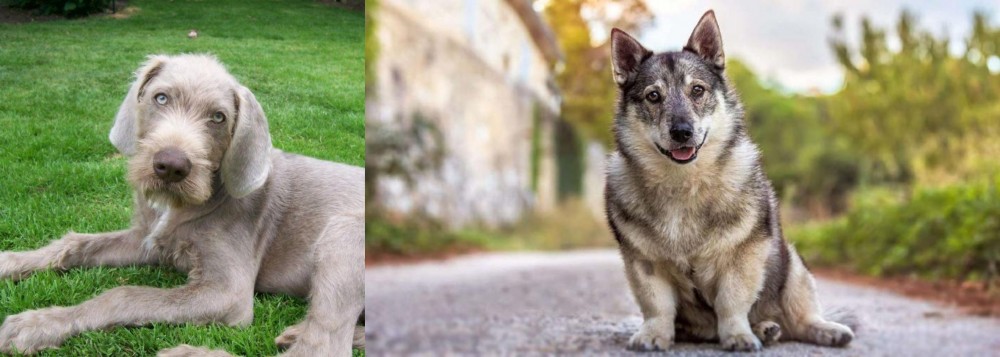 Slovakian Rough Haired Pointer is originated from Slovakia but Swedish Vallhund is originated from Sweden. Slovakian Rough Haired Pointer may grow 34 cm / 14 inches higher than Swedish Vallhund. Slovakian Rough Haired Pointer may weigh 21 kg / 47 pounds more than Swedish Vallhund. Both Slovakian Rough Haired Pointer and Swedish Vallhund has same life span. Slovakian Rough Haired Pointer may have less litter size than Swedish Vallhund. Slovakian Rough Haired Pointer requires Low Maintenance. But Swedish Vallhund requires Moderate Maintenance
Slovakian Rough Haired Pointer is originated from Slovakia but Swedish Vallhund is originated from Sweden. Slovakian Rough Haired Pointer may grow 34 cm / 14 inches higher than Swedish Vallhund. Slovakian Rough Haired Pointer may weigh 21 kg / 47 pounds more than Swedish Vallhund. Both Slovakian Rough Haired Pointer and Swedish Vallhund has same life span. Slovakian Rough Haired Pointer may have less litter size than Swedish Vallhund. Slovakian Rough Haired Pointer requires Low Maintenance. But Swedish Vallhund requires Moderate Maintenance
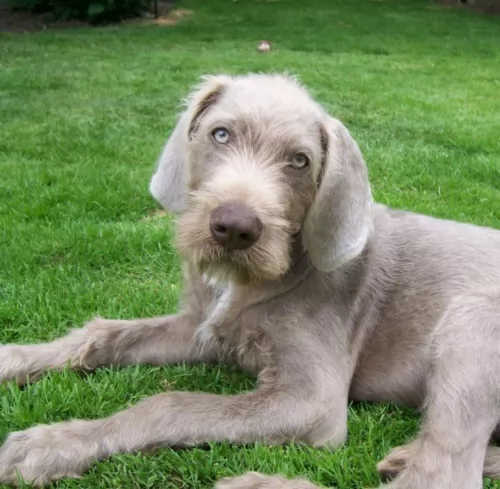 The Slovakian Rough Haired Pointer is a gundog from Slovakia. The dog came about by crossing the Cesky Fousek, German Wirehaired Pointers and Weimaraners. Other names for this dog include Slovensky Hrubosrsky Stavac.
The Slovakian Rough Haired Pointer is a gundog from Slovakia. The dog came about by crossing the Cesky Fousek, German Wirehaired Pointers and Weimaraners. Other names for this dog include Slovensky Hrubosrsky Stavac.
Developers were looking for a dog with good stamina – a dog capable of tracking hares and birds. The dog was first introduced into the United Kingdom in 1997.
 Known also as the Västgötaspets or Swedish cow dog, the Valhund hails from Sweden. It’s a herding dog, and was always a farm dog in that country.
Known also as the Västgötaspets or Swedish cow dog, the Valhund hails from Sweden. It’s a herding dog, and was always a farm dog in that country.
It was in 1943 that the dog was first recognized as a breed by the Swedish Kennel Club. Only later, in 1996, did the American Kennel Club start registering the breed.
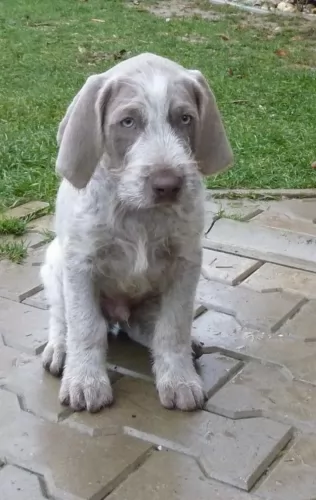 The Slovakian Rough Haired Pointer has got some looks from each of the dogs he was derived from. He is a fairly large dog and the coat is short to medium length and harsh and wiry and he has some additional hair around the face area.
The Slovakian Rough Haired Pointer has got some looks from each of the dogs he was derived from. He is a fairly large dog and the coat is short to medium length and harsh and wiry and he has some additional hair around the face area.
Most times the coat is a grey-brown shade. The ears are medium length and floppy and the tail is mostly docked at 50% of natural length, although these days it is often left long. It is carried downwards when at rest but raised when in action.
This is an energetic dog that is going to need a lot of exercise, so he won’t suit living with people who aren't active. He just loves to be outside and will thrive on a farm.
He is good with children and other dogs, but training and socialization should be provided for this dog. He is intelligent and will learn easily.
They’re affectionate dogs and their social nature makes them ideal for lively families. Because he is so active he is best suited for living in the suburbs or the countryside as opposed to living on a small property in the city.
 Looking much like a cross between a Corgi and the German Shepherd, the Swedish Valhund is a medium sized dog that stands between 30 and 34cm in height and weighs between 9 and 14kg.
Looking much like a cross between a Corgi and the German Shepherd, the Swedish Valhund is a medium sized dog that stands between 30 and 34cm in height and weighs between 9 and 14kg.
His medium length weather-resistant coat is available in wolf like shades – cream, grey, brown etc. The tail can be long or bobbed and the medium sized ears are held erect.
Intelligent, confident, independent, alert, playful and active, your Swedish Valhund promises to make a good family pet.
You'll need to be an active, outdoor type of family though, as he isn’t a couch potato type of dog, snoozing in front of the TV.
He wants to be up and about going on long walks or playing ball games that give him a good run. If he gets his fair share of exercise he can adapt to life in the city or the countryside.
He just loves his human family and wants to be constantly with them. He won’t do well if you just keep him locked outside away from everyone. He is social, alert innovative and entertaining as well as being a good guard dog.
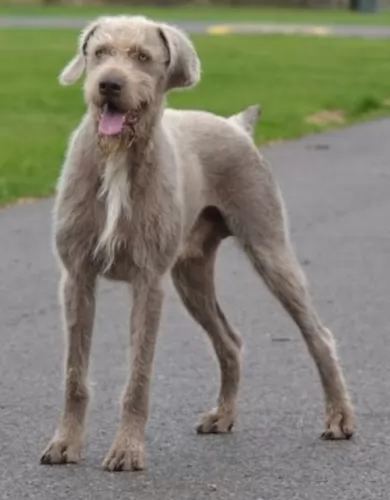 People who have owned these dogs rave about their loyalty and affection. They’re also intelligent and become very well behaved as they are dogs that also want to please their owners.
People who have owned these dogs rave about their loyalty and affection. They’re also intelligent and become very well behaved as they are dogs that also want to please their owners.
They’re gentle dogs too, just wanting to be loved by their human family and craving attention.
They’re also regarded as low maintenance pets and all these positive aspects of this dog make him a splendid choice if you're looking for a wonderful pet and companion
 Your Swedish Valhund is such a confident, independent dog and he promises to be a loving, faithful pet. He's also alert and will let you know if strangers are approaching his property.
Your Swedish Valhund is such a confident, independent dog and he promises to be a loving, faithful pet. He's also alert and will let you know if strangers are approaching his property.
He is a calm, easy going pet and is capable of adapting to quiet or noisy homes. He may be quite a strange looking dog, but he's got a whole lot of loving to give.
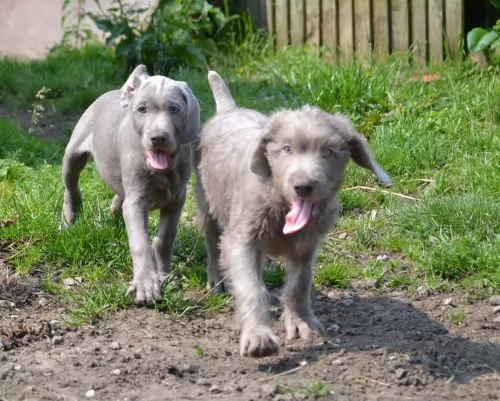 Your Slovakian Rough Haired Pointer can reach 14 or 15 years of age if he is looked after well but hip dysplasia is a threat for any dog.
Your Slovakian Rough Haired Pointer can reach 14 or 15 years of age if he is looked after well but hip dysplasia is a threat for any dog.
Any aged dog can be affected and this mobility disease is caused when the hip joint develops abnormally. Although hip dysplasia is genetic, environmental factors can also play a part. The idea is to get treatment from the vet so that your canine friend isn’t in pain.
This can cause so many problems in the body and not just the teeth. Have your dog’s teeth checked regularly and have them cleaned.
Your dog can have neck or back pain from this ailment, occurring when the discs and vertebrae of the spine become infected. Provide your dog with healthy food to ensure a strong immune system to fight off diseases like this.
 Capable of living a long, healthy life, the Swedish Valhund isn’t likely to fall victim to some of the many dog illnesses there are, and yet it is wise to be alert to some of them that he could get.
Capable of living a long, healthy life, the Swedish Valhund isn’t likely to fall victim to some of the many dog illnesses there are, and yet it is wise to be alert to some of them that he could get.
One of these is an hereditary eye disease known as retinopathy. Its where there is degeneration of the retinal photoreceptor cells. This eye disease can lead to blindness.
You need to be careful with this pet of yours, because with his long back and short legs he can so easily hurt his back if he leaps off a bed or high chair.
Whenever you pick this dog up, always support his legs and back. Don’t pick them up without supporting both the front legs and the rear end.
 Try and feed your Swedish Valhund two meals a day instead of just one, so that he doesn’t gobble down his food too quickly.
Try and feed your Swedish Valhund two meals a day instead of just one, so that he doesn’t gobble down his food too quickly.
Your dog can be prone to obesity, so you have to be careful with the way you feed him. Overfeeding a dog packs on extra weight and this puts strain on the joints.
Apart from the dry kibble that you feed him, try to include some tasty, nutritious homemade food such as boiled chicken, brown rice or pasta, sweet potatoes, carrots and spinach.
This can all be chopped up and added to his dry kibble. Some raw meat added to the diet can only be to his benefit. Remember to always ensure a bowl of fresh, cool water is available.
Give his thick coat a brush twice a week to remove dead hair. Brushing also stimulates the sebaceous glands that produces oil which gives the coat is sheen.
Trim his nails because left long, they can hook onto things and rip the skin open.
Check inside the ears too for redness which could mean an ear infection.You get dog wipes that you can wipe the ear out with. There are always professional dog groomers who can do these chores for you if you don't want to.
See that his vaccines are up to date and that if he shows signs of illness, you get him to the vet.